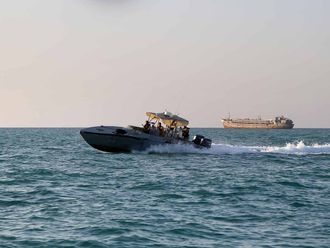Ankara: Turkey has not been given crucial data to help identify Daesh militants who fled their former stronghold in Raqqa last month and may have slipped out of Syria to threaten Turkish or western targets, Turkish officials said.
Hundreds of Daesh members and their families were allowed to leave Raqqa by Kurdish and Arab forces who captured the city in mid-October, spokesmen for the fighters and the US-led alliance which supports them said.
The coalition fighting Daesh in Syria and Iraq said last month that biometric information including fingerprints was taken from the militants before their convoy left Raqqa, so they would be known “if they resurface in the future”.
But two senior Turkish security officials told Reuters they had not seen any such data which would identify fighters from Raqqa among the hundreds of Daesh suspects rounded up in security sweeps in Turkish cities over the last two weeks.
“If the United States or the coalition received information about Daesh members who were withdrawn from Raqqa and is not sharing it with Turkey, how will we fight against terrorism together?” one official said.
“We didn’t receive any biometric data in this office,” another security official said.
A third government official said he believed the biometric data had not been shared with Turkey.
Ankara has bitterly criticised the deal to allow militants to leave Raqqa, saying it suspects some fighters have been smuggled across Syria’s northern border into Turkey and could pose an international threat.
“These Daesh members, released with their weapons, will cause deaths of innocent people in Europe, the United States, all over the world, especially in Turkey,” Prime Minister Binali Yildirim said last week.
His comments reflect long-running tensions with Washington over its support for the Kurdish YPG militia which spearheaded the fight to seize Raqqa from Daesh, as well as Turkey’s complaints at what it says is limited security cooperation.
Turkey sees the YPG as an extension of the outlawed Kurdish Workers Party (PKK) which has waged an insurgency in the south of the country since the 1980s, and says weapons supplied by the US will fall under PKK control.
Foreign Minister Mevlut Cavusoglu said last week that the Raqqa deal showed the YPG was more interested in gaining territory for a Kurdish state in Syria than defeating Daesh. Syrian Kurdish leaders say they are not seeking secession.
“They are in close cooperation with Daesh there,” Cavusoglu said. “These organisations appear to be fighting when it suits them.”
The coalition said around 250 fighters, accompanied by 3,000 people it described as human shields, left Raqqa on October 15 under the deal reached by Arab tribal leaders and a local civil council.
In a statement to Reuters, it said a coalition leader had attended talks where the deal was reached but was not an active participant, and it “explicitly disagreed with letting armed Daesh terrorists leave Raqqa”.
The coalition said screening of the departing fighters was carried out by Kurdish YPG-led Syrian Democratic Forces (SDF) who took Raqqa, and the Raqqa Civil Council. It referred questions about the biometric data gleaned from the tests to those two bodies.
As far as it was aware “none of the terrorists who departed Raqqa with the convoy on October 15, 2017 were able to legally or illegally gain entry to Turkey,” the coalition said, without saying whether it had been able to track them.
SDF spokesman Mustafa Bali said all the fighters who were allowed to leave Raqqa were in SDF detention. He did not say whether the biometric data had been shared.
But another Turkish official said Ankara suspected — based on interrogations of captured suspects — that some militants from Raqqa had managed to smuggle themselves across the border, despite increased security at crossings.
“We believe some of the captured Daesh militants may be from those that left Raqqa,” he said. “Since they came in with their families, we get this (information) from their families”.
There was no specific intelligence of a threat to Turkey or Europe at the moment, he added, but an attack could take place at any time. “We have brought measures to counter this to their highest level,” he said.
Exchange of information with Europe and the United States was continuing, despite any political differences, he added.
France, where militants killed 130 people in coordinated strikes across Paris in November 2015, said last week the threat of an attack was no greater than over the last two years and security services were either arresting or monitoring militants who returned from Syria and Iraq.












